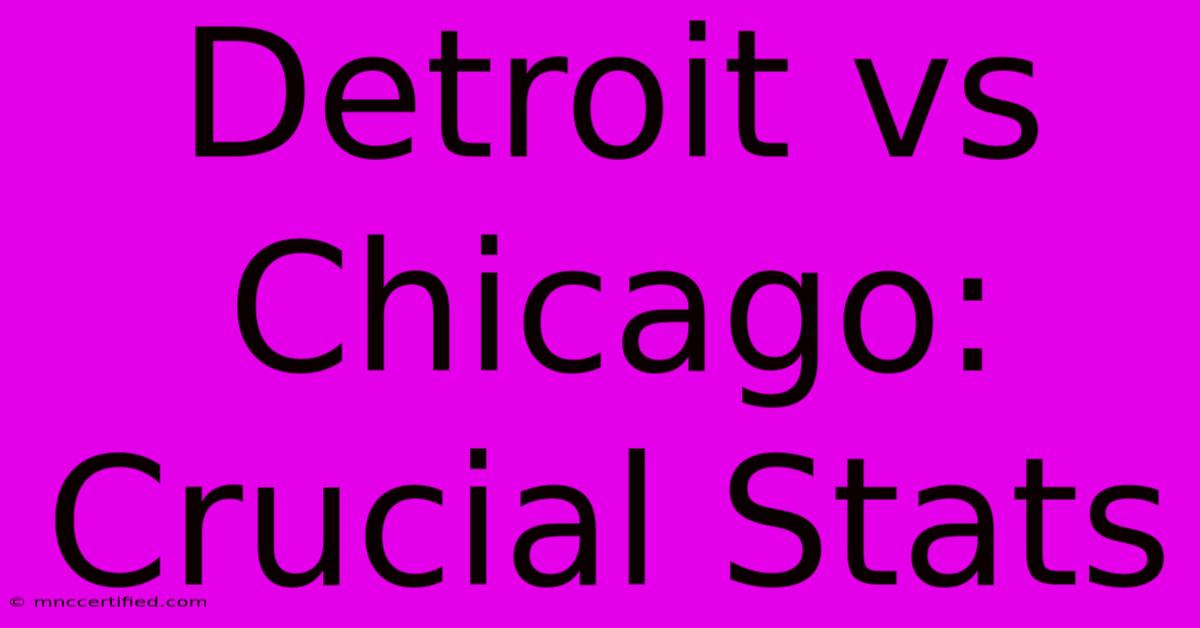Detroit Vs Chicago: Crucial Stats

Table of Contents
Detroit vs. Chicago: A Crucial Statistical Showdown
Choosing between Detroit and Chicago often boils down to personal preference, but a deep dive into crucial statistics can illuminate key differences and help you decide which city best suits your needs. This comparison focuses on factors that significantly impact quality of life, economic opportunities, and overall livability. We'll analyze data across several key areas to provide a comprehensive overview.
Cost of Living: Dollars and Sense
One of the most significant factors for many individuals is the cost of living. Both cities present varying costs depending on location within the city limits and lifestyle, but generally speaking, Chicago tends to be more expensive than Detroit.
Housing: Rent vs. Buy
- Chicago: Expect higher rent and home prices, particularly in desirable neighborhoods. Competition for housing is fierce, driving costs up.
- Detroit: Offers significantly more affordable housing options, both for rent and purchase. This is a major advantage for budget-conscious individuals and families.
Groceries & Transportation: Daily Expenses
- Chicago: Grocery costs are generally higher in Chicago than in Detroit, and public transportation, while extensive, can be expensive. Owning a car in Chicago often involves high parking fees.
- Detroit: Groceries are typically cheaper, and while public transportation isn't as robust as Chicago's, car ownership is often more practical and less costly due to lower parking fees and insurance.
Job Market & Economy: Opportunities and Growth
Both cities boast diverse economies, but their strengths lie in different sectors.
Industry & Employment Rates: A Sectoral Breakdown
- Chicago: A major financial and commercial center, Chicago offers a vast array of job opportunities in finance, insurance, technology, and healthcare. The city's large and diverse economy generally leads to higher average salaries.
- Detroit: Historically known for the automotive industry, Detroit's economy is undergoing a transformation with growth in technology, healthcare, and creative industries. While job growth is promising, average salaries may be lower compared to Chicago.
Culture & Lifestyle: Vibrant Cityscapes
Beyond the numbers, the cultural experiences offered by each city are crucial considerations.
Arts & Entertainment: A Cultural Comparison
- Chicago: Chicago boasts a world-renowned theater scene, impressive museums (Art Institute of Chicago!), and a thriving music scene. It offers a more cosmopolitan and diverse cultural landscape.
- Detroit: Detroit possesses a rich musical heritage (Motown!), a burgeoning art scene, and unique historical sites. Its cultural offerings are more concentrated and reflect its distinct history.
Safety & Crime Rates: A Vital Consideration
Both cities have areas with higher and lower crime rates. Accessing up-to-date crime statistics from reliable sources such as local police departments and FBI data is crucial for informed decision-making. Always conduct thorough research specific to neighborhoods you are considering.
Conclusion: Making the Right Choice
The "better" city depends entirely on individual priorities and preferences. Chicago offers a more expensive but potentially higher-paying job market and a broader cultural landscape. Detroit offers significantly lower costs of living, while its job market is evolving with promising growth potential.
By carefully weighing the crucial statistics presented here and conducting further research based on your individual needs and preferences, you can make an informed decision about whether Detroit or Chicago is the right city for you. Remember to consider factors beyond the scope of this article, such as climate, proximity to family and friends, and personal lifestyle preferences.

Thank you for visiting our website wich cover about Detroit Vs Chicago: Crucial Stats. We hope the information provided has been useful to you. Feel free to contact us if you have any questions or need further assistance. See you next time and dont miss to bookmark.
Featured Posts
-
Lions Vs Bears Injury Report And Outlook
Dec 23, 2024
-
Key Matchups Lions Vs Bears Stats
Dec 23, 2024
-
Death In Paradise Christmas Special And New Detective
Dec 23, 2024
-
Nfl Week 16 Jets Fall 19 9 To Rams
Dec 23, 2024
-
Match Report Wolves Dominate Leicester 3 0
Dec 23, 2024